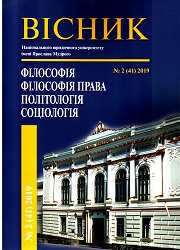ГЕНДЕРНИЙ ВИМІР УКРАЇНСЬКОЇ ПОЛІТИКИ
GENDER DIMENSION OF UKRAINIAN POLITICS
Author(s): Natalya Vitaliyivna ShkurkoSubject(s): Gender Studies, Civil Society, Politics and communication, Politics and society, Sociology of Politics, Geopolitics
Published by: Національний юридичний університет імені Ярослава Мудрого
Keywords: gender inequality; gender politics; gender stereotypes; woman-leader; politics
Summary/Abstract: Problem setting. Modern Ukrainian politics requires the formation of a new type of political leader - a woman and a man, which combines both “female” and “male” managerial qualities. They are women-leaders who inclined to compromise, peaceful forms of activity, a complex vision of problems, taking into account the prospect of any decision, for joint actions with male politicians, and make it possible to unite efforts in achieving the important social and political goals of the country.Recent research and publications analysis. Since the proclamation of Ukraine as an independent state, the problems of women’s participation in the political life of Ukraine have become the subject of numerous scientific discussions, conferences, seminars, political research.Paper objective. The purpose of the article is to elucidate gender stereotypes that affect the status of the woman-leader at higher levels of Ukrainian authorities. Social thinking is extremely stereotyped, and double standards are the prevailing norm all over the world and particularly in Ukraine. The origins of this phenomenon in our state reach even more primitive times, and the immediate consequences negatively affect the position of women and the development of society as a whole, including in the political sphere. Ukraine is still at the initial stage of the formation of gender democracy and the political-state system, the norms declared by it are torn off from the real state of affairs.Paper main body. The processes of democratization and humanization embracing contemporary Ukrainian society include the creation of various opportunities for self-realization of the individual regardless of its nationality, social origin, gender and age. The development strategy of the 21st century is aimed at establishing the principles of parity representation of articles based on gender balance and gender balance in society. The basis for the functioning of society in the third millennium should be the system of expressing the will of both sexes - men and women as equal rights, not only legally enshrined, but also really secured in political and legal principles, actions and building up public and state structures. Leading women, having a tendency towards political activity, communicating with people, speaking with the people, the ability of speaking, having great will and stubbornness, organizational skills, firmness and determination, devotion to the ideals of their Motherland, have been able to achieve high state positions, due to favorable circumstances, stubbornly fighting, became subjects of supreme power. Taken together, it is evident that a woman-leader will eventually be able to move from a category of rare phenomena to a more common fact in the political life of European society. The civilized world has long understood and accepted the need for active participation of women in politics and undoubtedly acknowledged the invaluable benefits and importance of such participation. The presence of women in politics changes its character, its orientation in favor of social-oriented programs, the ideals of humanism and non-violence.Conclusions of the research. Summarizing our study, it should be noted that Ukrainian politics is permeated with gender stereotypes, and despite numerous bills that ensure equality between sexes, we continue to see the presence of gender inequality. This problem remains rather relevant today and requires further research. It is important to determine the role of social structure in shaping a woman as a political leader; disclosure of the essence of women’s leadership as a style of political activity, as well as a generalization of the historical experience of women’s political leadership in Ukraine.
Journal: Вісник НЮУ імені Ярослава Мудрого. Серія: Філософія, філософія права, політологія, соціологія
- Issue Year: 41/2019
- Issue No: 2
- Page Range: 173-185
- Page Count: 13
- Language: Ukrainian

